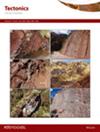瓦里斯坎断裂带崩塌期间一个变形的楔顶盆地:法国东北部二叠系-石炭系洛林盆地
IF 3.6
1区 地球科学
Q1 GEOCHEMISTRY & GEOPHYSICS
引用次数: 0
摘要
摘要/ Abstract摘要:本文提出了二叠统—石炭系洛林盆地(法国东北部)的一种新的构造模式。洛林盆地是一个发育于Variscan造山运动晚期(约315-270 Ma)的大型山间盆地。利用数字化测井资料和重新处理的地震资料,对该盆地的运动演化进行了解析,该盆地位于雷诺西造山带。盆地形成于碰撞后期(早-中宾夕法尼亚),位于萨克森图林根逆楔上的楔顶位置。同造山带由主要的东南向西的梅斯逆冲向北划分,该逆冲系是中宾夕法尼亚(威斯特伐利亚晚期)时期扩张的逆冲系统的一部分。地震数据提供了负构造反转的证据,允许在前背斜上形成同裂谷沉积中心(晚宾夕法尼亚-早二叠世)。这些背斜的侵蚀形成了一个主要的不整合面,标志着造山后崩塌的开始。早二叠世晚期的缩短期(萨连期)使原逆冲断层和正断层重新活化,形成了盆地的晚期隆升。造山后阶段在盆地尺度上是复杂的、历时性的,在短时间内(<10 Myr)在同一地区可以记录到挤压和伸展。晚石炭世沿雷诺西缝合带的逆构造反转是由瓦里斯坎造山根岩石圈剥离引起的。伴随而来的软流圈物质上涌被强烈的岩浆活动记录下来,并可被认为是随后中生代巴黎盆地热沉降的主要触发因素。本文章由计算机程序翻译,如有差异,请以英文原文为准。
A Deformed Wedge‐Top Basin Inverted During the Collapse of the Variscan Belt: The Permo‐Carboniferous Lorraine Basin (NE France)
Abstract A new structural model is presented for the Permo‐Carboniferous Lorraine Basin (NE France), a major intramountain basin that developed during the latest stages of the Variscan orogeny (ca. 315–270 Ma). Digitalized well logs and reprocessed seismic data were used to decipher the kinematic evolution of this basin located along the Rhenohercynian orogenic suture zone. The basin was initiated during the late collision stage (Early to Middle Pennsylvanian) in a wedge‐top position upon the Saxothuringian retro‐wedge. The syn‐orogenic sequence is delimited to the north by the major SE‐verging Metz Thrust, which is part of the backthrust system that propagated during Middle Pennsylvanian (Late Westphalian). Seismic data provide evidence of negative tectonic inversion, allowing the formation of syn‐rift depocenters (Late Pennsylvanian‐Early Permian) above the former anticlines. Erosion of these anticlines results in a major unconformity marking the onset of post‐orogenic collapse. The late Early Permian shortening (Saalian phase) is suggested to reactivate former thrusts and normal faults, thus generating late uplift of the basin. The post‐orogenic phase is complex and diachronous at basin scale, and both compression and extension can be recorded in the same area over a short period (<10 Myr). The Late Carboniferous negative tectonic inversion along the Rhenohercynian suture zone is proposed to result from the lithospheric delamination of the Variscan orogenic roots. The associated upwelling of asthenospheric material is recorded by intense magmatic activity, and can be, in turn, considered as the main trigger for the subsequent thermal subsidence of the Mesozoic Paris Basin.
求助全文
通过发布文献求助,成功后即可免费获取论文全文。
去求助
来源期刊

Tectonics
地学-地球化学与地球物理
CiteScore
7.70
自引率
9.50%
发文量
151
审稿时长
3 months
期刊介绍:
Tectonics (TECT) presents original scientific contributions that describe and explain the evolution, structure, and deformation of Earth¹s lithosphere. Contributions are welcome from any relevant area of research, including field, laboratory, petrological, geochemical, geochronological, geophysical, remote-sensing, and modeling studies. Multidisciplinary studies are particularly encouraged. Tectonics welcomes studies across the range of geologic time.
 求助内容:
求助内容: 应助结果提醒方式:
应助结果提醒方式:


